

Drawbacks of Investing in Rental Property

For all its upside, investment in rental property through direct ownership, has its downsides. For many investors, the risks and responsibilities of direct real estate investing may be too great. At the end of the day, the success of a rental property falls squarely on the shoulders of the investor. If managed poorly, a seemingly lucrative investment opportunity can quickly turn south overnight. Before investing directly in rental property, investors should consider all the drawbacks.
- Property management expertise
There are many steps to acquiring and managing an investment property. One misstep, one wrong turn, and a potentially lucrative investment opportunity can turn into a money pit. Knowing how to identify a good rental property, and having the expertise to manage it once acquired, are key to ensuring a profitable long-term investment. Direct investors are required to determine expected occupancy rate, set monthly rental rates, manage operating costs, prep the property for tenants and stay abreast of Fair Housing laws to avoid discrimination complaints, fines and lawsuits. Successful landlords typically have substantial property management experience or end up hiring an experienced property manager in their stead. Conceding some control of your investment by turning over the years to a property manager may be the logical choice, but using a professional property manager adds up, eating away from at your return on investment.
- Active management
Direct investment in rental property requires 24/7 hands-on management. Once you own a rental property, you are responsible for advertising vacancies, finding and screening tenants, drafting lease agreements, overseeing property maintenance and repairs, checking tenants in and out, processing evictions, and more. Hiring a property manager can alleviate much of the active management burden, but if you hire a poor property manager who drops the ball, you risk losing tenants and the burden of ongoing management falls back to you.
- Financing
When it comes to owning rental property directly, the old adage holds true: you need money to make money. Securing a loan to purchase a rental property generally requires a down payment of 10-20% of the purchase price. To finance certain types investment properties, such as multi-family apartments or commercial office buildings, lenders may require as much as 30% down. For a $500,000 investment property that’s $150,000. In addition to coming up with a sizeable down payment, investors who finance their property often have to contend with high interest rates. If an investor is unable to come up with the required down payment or can’t afford to carry a loan with a high interest rate, direct ownership is not possible. Even investors with cash to buy a property outright need to maintain adequate occupancy rates to ensure profitability. For rental property owners who have less than favorable financing terms, near-term profitability may be elusive.
Topics: Real Estate, Investment, Drawbacks, Rental Property, Management
Work cited: Becton Loveless
If I can help in any way please let me know, [email protected]. Stay Safe & Healthy.




Comments